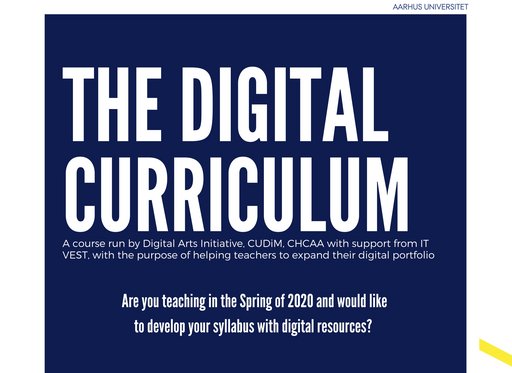On this page you can find information regarding The Digital Curriculum, a course aiming to help teachers expand the portfolio of subject specific digital tools.
The course is run by head of Digital Arts Initiative, Mads Rosendahl Thomsen, in collaboration with Associate Professor Christian Dalsgaard, CUDiM, Associate Professor Kristoffer Laigaard Nielbo, Center for Humanities Computing Aarhus, and with support from IT VEST.

As the disciplines of arts and humanities get access to more data – through social media, digitized archives, more accessible statistics, new ways of collecting data, etc. – the demands of what we should teach our students change. In collaboration with CUDiM and Center for Humanities Computing Aarhus, Digital Arts Initiative runs The Digital Curriculum for teachers at Arts, Aarhus University, with the purpose of helping teachers to expand the portfolio of subject specific digital tools.
The course consists of a combination of workshops, seminars, sparring, and follow up on classroom use. The course kicks off with a workshop on August 15, 2019 (see program here) that is open for all and continues with one-day seminars in October and December as well as individual sparring in November and January.
The course is open to 15-20 participants, primarily from Arts, Aarhus University. Each participant will be granted a compensation of 30 hours in their time sheet. During the course the participants will develop course elements based on their own field, which can be used in teaching in Spring 2020 (or in some cases in the Fall of 2020).
The Digital Curriculum is coordinated by head of Digital Arts Initiative, Professor Mads Rosendahl Thomsen, in collaboration with Associate Professor Christian Dalsgaard, CUDiM. The Center for Humanities Computing Aarhus are represented by Associate Professor Kristoffer L. Nielbo, who will assist with staff for technical support during the education. Visiting professor Matthew Wilkens, University of Notre Dame, will also take part in the course.
Applications for The Digital Curriculum are made by sending name, department, title of the course you will be teaching, and 5-8 lines, explaining the ideas for and challenges of integrating digital methods in the course to emi@cc.au.dk before August 10, 2019. Feel free to contact us for any question you may have.
August 2019: Kick-off 15th August with a whole day seminar open for all teachers.
9.15 Introduction by Mads Rosendahl Thomsen and Christian Dalsgaard
9.40 Curriculum cases:
11.00 Coffee
11.15 Experiences from Danish high schools
11.45 Resources and goals
12.15 Lunch
13.00 Workshop
14.45 Coffee
15.00 2 minutes presentations of draft curricula
16.00 End of seminar
October 2019: Whole day seminar about details of course plan, sparring with Center for Humanities Computing Aarhus and Center for Teaching Development and Digital Media.
Presentation by Matthew Wilkens and Elizabeth Evans, University of Notre Dame and guest researchers at Aarhus University in the Fall of 2019.
November: Individual feedback and hands on sessions.
Establishment of sparring groups among the participants.
December: Whole day seminar. Demonstration of exercises in groups.
Sparring in groups about the pedagogical situation.
March: Half day seminar with follow up on experiences with teaching.
June: Open seminar which will sum up experiences. Besides course participants, participation of department- and studyleaders and students with follow up on experiences.
July: Evaluation rapport and sum up of course material in a shareable form is prepared by projects, assisted by the student assistant of Digital Arts Initiative.